Existing User Log In
New User Registration
Register for a free account to gain full access to the VGChartz Network and join our thriving community.



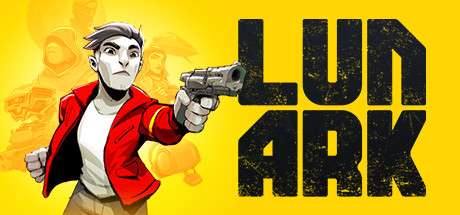

America - Front
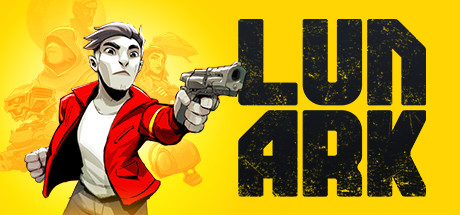

America - Back

Canari Games
Platform
 (Add Date)
(Add Date) (Add Date)
(Add Date) (Add Date)
(Add Date)
| Owners: | 0 |
| Favorite: | 0 |
| Tracked: | 0 |
| Wishlist: | 0 |
| Now Playing: | 0 |
In the "special thanks" section of Lunark's credits, you'll see some familiar names: Jordan Mechner, Eric Chahi, and Paul Cuisset. These programmers, who designed Prince of Persia, Another World, and Flashback, respectively, absolutely deserve the nod. Their groundbreaking work with cinematic 2D platformers cleared the way for a game like Lunark, after all. Indeed, if you find yourself missing the filmic flair and realistic physics of those 80s and 90s classics, you will feel right at home with Lunark.
Set on an alien planet in the far future, Lunark tells the story of Leo, a courier with mysterious superhuman abilities and accelerated aging. When a delivery to his benefactor goes terribly wrong, Leo finds himself hunted by murderous droids directed by the totalitarian Lunark regime and its AI overlord NOAH. The unwitting hero must befriend locals, escape the city, search for clues, and, eventually, uncover the dark history of NOAH and the truth about his own origins.
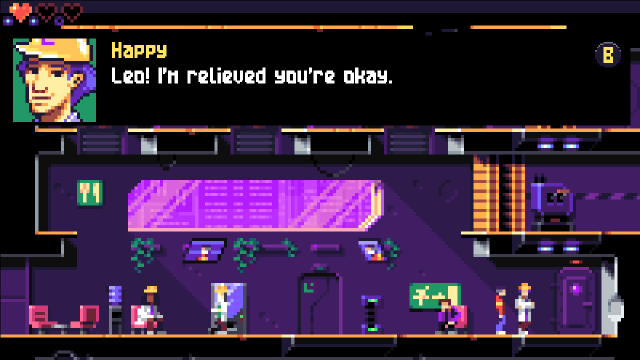
The story in Lunark is engaging, if a bit underdeveloped. There are some bold, ambitious sci-fi ideas at play here, along with a convincing alien world filled with ancient ruins, city slums, otherworldly forests, and, perhaps most striking of all, a floating penitentiary high above the clouds. The main issue is that there isn't enough time to unpack all the thought-provoking ideas or get to know the secondary characters. Early chapters focused on Leo's efforts to escape a city under lockdown are the most impressive on a storytelling level, because the world-building is so strong. After that opening hour, the game marches quickly toward the ending, introducing important people and events, but refusing to linger on them. The entire game is only three to four hours long, which feels far too short, from both a narrative and gameplay perspective.
That said, the gameplay is good enough, while it lasts. Lunark is a cinematic platformer inspired by the greats of the 80s and 90s, so its mechanics and physics are quite different from your standard 2D platform game. In other words, it's more Oddworld than Super Mario World. That means Leo cannot stop on a dime, double jump, or survive huge drops that would normally kill a person. Rather, he must measure each leap perfectly the first time, or else; he must walk right up to a ledge in order to climb up; and he must monitor his forward momentum, lest he slip over a platform and fall to his death. There's a steep learning curve for players unfamiliar with titles like Flashback, but with enough practice it becomes second nature. The final result is a set of platforming, puzzle, and combat changes that feel very much grounded in reality, which creates a unique and different kind of challenge.
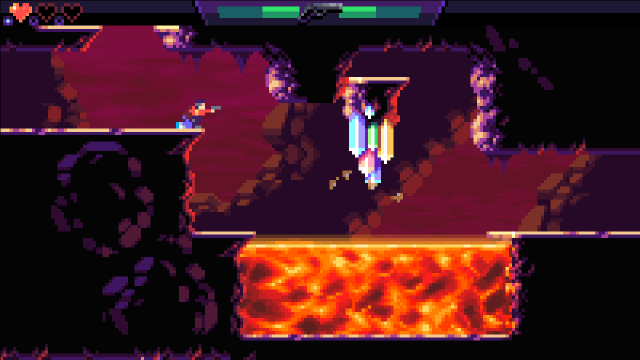
The challenge of Lunark isn't always that intimidating, however, which is something of a mixed blessing. The developers at Canari Games, led by Johan Vinet, deserve kudos for not embracing the dizzying difficulty level of the classics, which — let's be honest — relied heavily on trial-and-error problem-solving. The studio could have leaned on a bunch of "gotcha" moments in an attempt to pad the game's running time, but, to its credit, it didn't. At the same time, though, Canari may have gone too far in the opposite direction, creating an experience that's a touch too forgiving. Healing plants and shield charges are found almost everywhere, and if players explore off the beaten path they'll be rewarded with gun upgrades and shells, the latter of which can be turned in for health upgrades. In the end, Lunark is a cinematic platformer far more approachable than the giants that inspired it, but also one that can be defeated rather quickly.
Really, the only area where Lunark feels truly demanding is its checkpoint system, and that's due to its inconsistency from level to level.
One thing that's never inconsistent in Lunark: its audiovisual component. Canari nailed the look and feel of the game, particularly in its incredibly nostalgic rotoscoped cut-scenes. Honestly, for cinematic platform fanatics, the game's cut-scenes are almost worth the $19.99 alone. The in-game graphics and animations are also fetching; static screenshots really don't do them justice. Could Lunark have benefited from larger, more detailed sprites? Surely. But it works regardless.
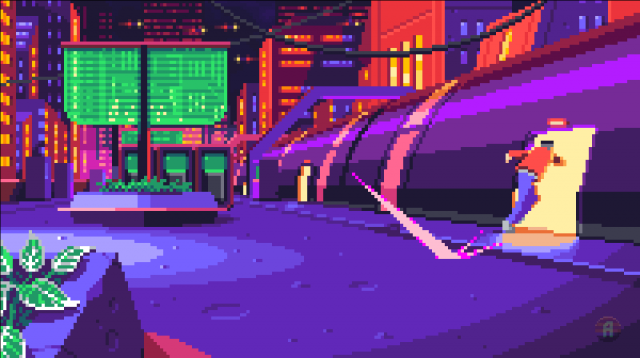
The game's music, by Vinet, is also memorable. The track in the opening caves area is a mixture of lo-fi electronica and icy percussion; the mega-city music enjoys a funky synth sound; and the floating prison has a high-stakes, on-edge vibe that pairs perfectly with its do-or-die stealth section. This is a sneaky good soundtrack.
Mechner, Chahi, and Cuisset would be proud of Lunark, despite its flaws. The game successfully channels the spirit of their old-school cinematic platformers, thanks to its realistic physics, deliberate gameplay, and rotoscoped animation. If you're a fan of Flashback and the sort, you really can't go wrong with Lunark, even if it's a tad forgiving and far too short. If you're less comfortable with the sub-genre, or want something meatier, consider waiting for a sale. In any event, it's great to see a modern developer experiment with a dusty game type long removed from its glory days. Hopefully more cinematic platformers will follow.









